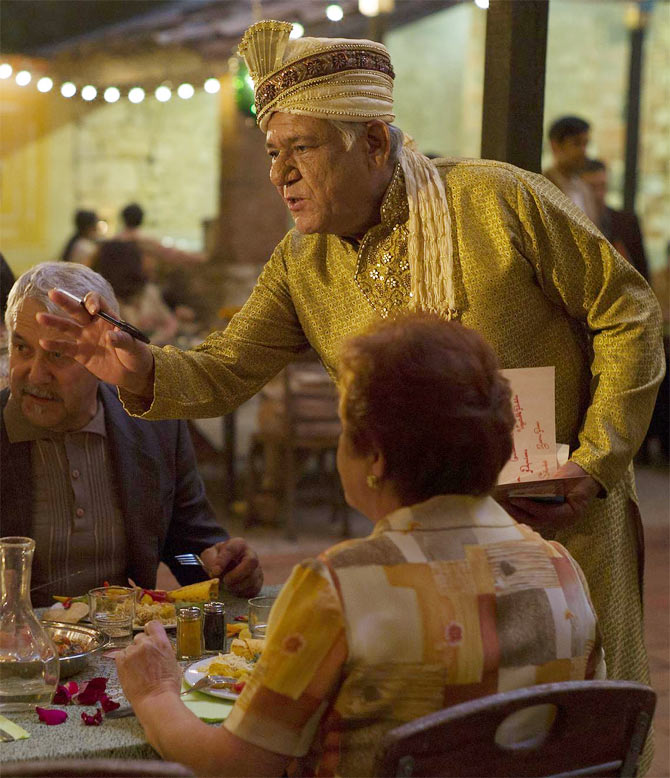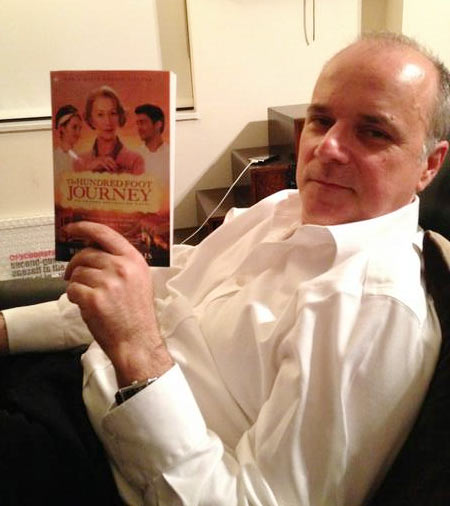 | « Back to article | Print this article |
'Om Puri deserves to be nominated for an Oscar'
Author Richard C Morais tells Arthur J Pais/Rediff.com he is amazed how Om Puri and Helen Mirren have brought his characters to life in the film The Hundred Foot Journey.
An American born in Portugal and raised in Switzerland, Richard C Morais, who has worked for Forbes for 25 years, has lived most of his life overseas, returning to the United States in late 2003.
He wrote many cover stories for Forbes, from billionaire profiles to corporate dynamics, but he was best known for unusual stories like the hashish entrepreneurs of Holland and the lives of the ship breakers of Gujarat as well as the human organ traders of China.
Morais is currently the editor of Barron's Penta, a quarterly magazine that advises wealthy families on investments.
His novel The Hundred-Foot Journey went on to become an international bestseller and was published in 28 countries. It was featured as an Editor's Choice in The New York Times Book Review and selected as one of the Best Summer Reads of 2010 in Winfrey's O, The Oprah Magazine.
What are the larger issues in your novel?
The actual distance from the French and the Indian restaurants in my novel is not far: One hundred feet, no more, no less. But the hundred-foot journey begins in that moment when you bravely drop what is familiar and cross over into a new realm that is far out of your comfort zone and cross over into unfamiliar territory on a quest of self-discovery.
This is true for both families -- the French woman who runs a Michelin-star restaurant and the owners of the new Indian restaurant.
It is also particularly true for the son of the immigrant family, Hassan, whose character celebrates the point in life when some of us leave the familiar, the comfort zone and try something big in life.
Conversely, I recognise it may not be wise for everyone to uproot himself or herself from family roots, from the soul of their ancestors and locate in very different cultures. Many refugees go through this problem.
In this novel, I write about families who have to make the choice -- and they become better for that.
It is a profound journey -- however small in physical distance -- that materially changes the course of your life for the better.
When you have a calling in life, you may have to uproot yourself, severe ties and reinvent a new life.
The journeys and the risks people take in the novel and the film are not easily made. Hassan has moved from India to a small French town. He then goes to Paris, but he is distracted from his craft and ambition of making it as a big chef. The food he is making is cold and clinical, and for the first time in his life he finds himself simply going through the motions.
The French have this marvelous word, deracine, which means uprooted. There are many people in the world today, like Hassan, like Papa, who come from one culture, but their life and work has taken them to another.
I think when you are like that, you ask yourself, ‘Where is home?’
Please click Next to see more...
'I wrote this novel to trick Ismail Merchant into making it a film'
How did the novel come about?
When I was stationed in London, I had written for Forbes a story on the Merchant Ivory film team. I became friendly with Ismail Merchant who loved food and cinema. I wrote this novel out of self interest, to trick Ismail making it into a film. I also made the family from India Muslim because Ismail was one (chuckles).
I thought of working with Ismail after he invited me to a screening of his film In Custody in London. It was the first film he had directed after having been a producer for over two-and-a-half decades.
I remember though Shashi Kapoor was in the lead, Om Puri had a small but very good part in it.
I told Ismail, your two big passions are cinema and food. How about combing the two? But he was busy with other projects and then he suddenly died.
It was not easy selling this book to publishers in America, right?
Many agents told me, why should we publish a book by an American in the voice of an Indian when there were so many excellent Indian writers doing that? I gave serious thought to what they were telling me.
I then persuaded Forbes to send me an assignment to India where I met the Godrej family that I had known for some time. They introduced me to the chef in Khyber restaurant (a well-known restaurant in south Mumbai).
Even then, the book was first published in India by HarperCollins, and it got excellent reviews. I have had many good reviews in The Washington Post and The New York Times, but I liked the best (review) in an Indian publication, which said it was my destiny to write in the voice of an Indian.
You have seen the film. What did you think of it?
It is lovely and should have a very broad appeal to audiences across the world. Of course, the movie version differs in some areas from the novel, but it has celebrated the spirit of the book.
I am stunned at the performances. I had wondered how the artists would bring alive my characters, but I knew I did not have to worry. For artists of this standard could make it all come together.
Helen Mirren, of course, is very well-known, but Om Puri, though he has acted in a few American and British films, is not widely known. I believe he deserves to be nominated for an Oscar.

